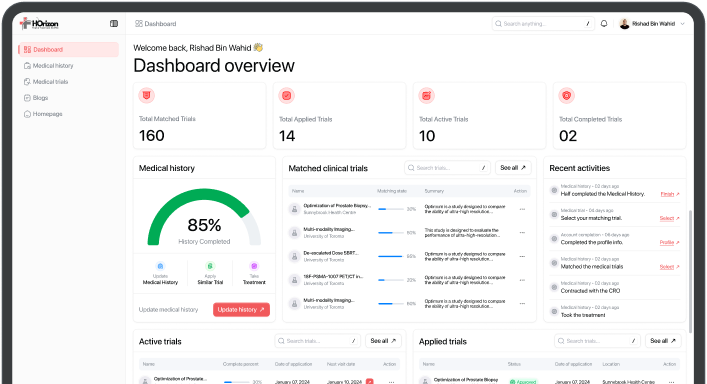Becoming a clinical trial volunteer is a significant decision that can have profound impacts not only on your own health and well-being but also on the advancement of medical science. Clinical trials are at the heart of all medical advancements, from the development of new medications to the improvement of current treatments and the discovery of innovative ways to diagnose, prevent, or reduce the risk of diseases. Horizon Trials, with its mission to streamline the connection between clinical trials and volunteers, is revolutionizing how individuals engage with these crucial studies. Here’s a comprehensive guide to what it means to be a clinical trial volunteer and how platforms like Horizon Trials are making participation more accessible and impactful.
What Is a Clinical Trial?
Clinical trials are research studies that test new medical treatments, drugs, devices, or approaches to prevent, diagnose, or manage diseases. They are a critical part of the medical research process, helping researchers determine if a new therapy is safe, effective, and better than existing options.
These studies involve human participants and follow strict protocols to ensure safety and accuracy. Clinical trials are essential for advancing medical knowledge and bringing innovative treatments to patients who need them.
Key Goals of Clinical Trials
- Testing Safety: Ensuring that the treatment or procedure is safe for human use.
- Evaluating Efficacy: Determining whether the new therapy works as intended to treat or prevent a condition.
- Comparing Treatments: Assessing if the new approach is more effective than existing treatments.
- Identifying Side Effects: Understanding potential risks or adverse effects.
Phases of Clinical Trials
Clinical trials are conducted in phases, each with specific goals and participant groups:
- Phase I: Tests the safety and dosage of a new treatment with a small group of participants.
- Phase II: Evaluates the treatment’s effectiveness and further examines safety in a larger group.
- Phase III: Confirms effectiveness, monitors side effects, and compares the new treatment to standard therapies with thousands of participants.
- Phase IV: Conducted after approval to gather additional information about long-term safety and effectiveness.
Why Become a Clinical Trial Volunteer?
Volunteering for a clinical trial is a deeply personal decision with a myriad of motivations behind it. Here are some reasons why individuals choose to participate:
- Access to New Treatments: Participants often have access to cutting-edge treatments before they are widely available to the public.
- Contributing to Science: Volunteering in clinical trials contributes to medical advancements that can save lives and improve health outcomes for future generations.
- Enhanced Medical Care: Volunteers typically receive close medical attention from the research team, along with comprehensive health monitoring throughout the study.
- Potential Personal Benefits: While not guaranteed, some volunteers experience significant improvements in their health conditions through trial interventions.
Understanding the Process
Participating in a clinical trial involves several steps, from finding suitable trials to understanding your rights and responsibilities as a volunteer:
Finding Clinical Trials with Horizon Trials: Horizon Trials simplifies the process of finding clinical trials by using an innovative platform that matches potential volunteers with studies suited to their health conditions and preferences. By inputting your medical history and treatment needs, you can quickly identify trials looking for volunteers like you.
Informed Consent: Before participating, you’ll go through the informed consent process, where you’ll learn about the trial’s purpose, procedures, potential risks and benefits, and your rights as a participant. This ensures that you’re making an informed decision about your participation.
Participation and Monitoring: Once enrolled, you’ll follow the trial protocol, which may involve taking medications, undergoing treatments, or attending medical assessments. Throughout the trial, your health will be closely monitored to assess the intervention’s effects and ensure your safety.
Rights and Responsibilities: As a volunteer, you have the right to privacy, respectful treatment, and full disclosure of the trial’s purpose and potential risks. You’re also responsible for adhering to the trial protocol and communicating openly with the research team.
Why Horizon Trials Is a Game Changer
Horizon Trials is transforming the landscape of clinical trial participation by making the process more accessible and efficient for both volunteers and researchers. Here’s how:
- Personalized Matches: The platform uses advanced algorithms to match volunteers with trials that specifically meet their health profiles, significantly increasing the likelihood of successful and meaningful participation.
- Simplified Process: By providing a centralized platform for finding and applying to clinical trials, Horizon Trials eliminates the complexity and fragmentation that often deter potential volunteers.
- Enhanced Support: Horizon Trials offers comprehensive support throughout the trial process, including assistance with understanding informed consent, navigating logistical challenges, and addressing any concerns that arise during participation.
- Advancing Medical Science: By streamlining the connection between volunteers and clinical trials, Horizon Trials accelerates the pace of medical research, leading to quicker discoveries and advancements in healthcare.
Volunteering for a clinical trial is a noble and impactful decision. Through platforms like Horizon Trials, the process becomes not just more straightforward but also more meaningful, connecting you with opportunities to contribute to medical breakthroughs while potentially benefiting from the latest healthcare innovations. Whether you’re driven by the desire to access new treatments, contribute to the greater good, or both, becoming a clinical trial volunteer is a powerful way to make a difference in the world of healthcare.

